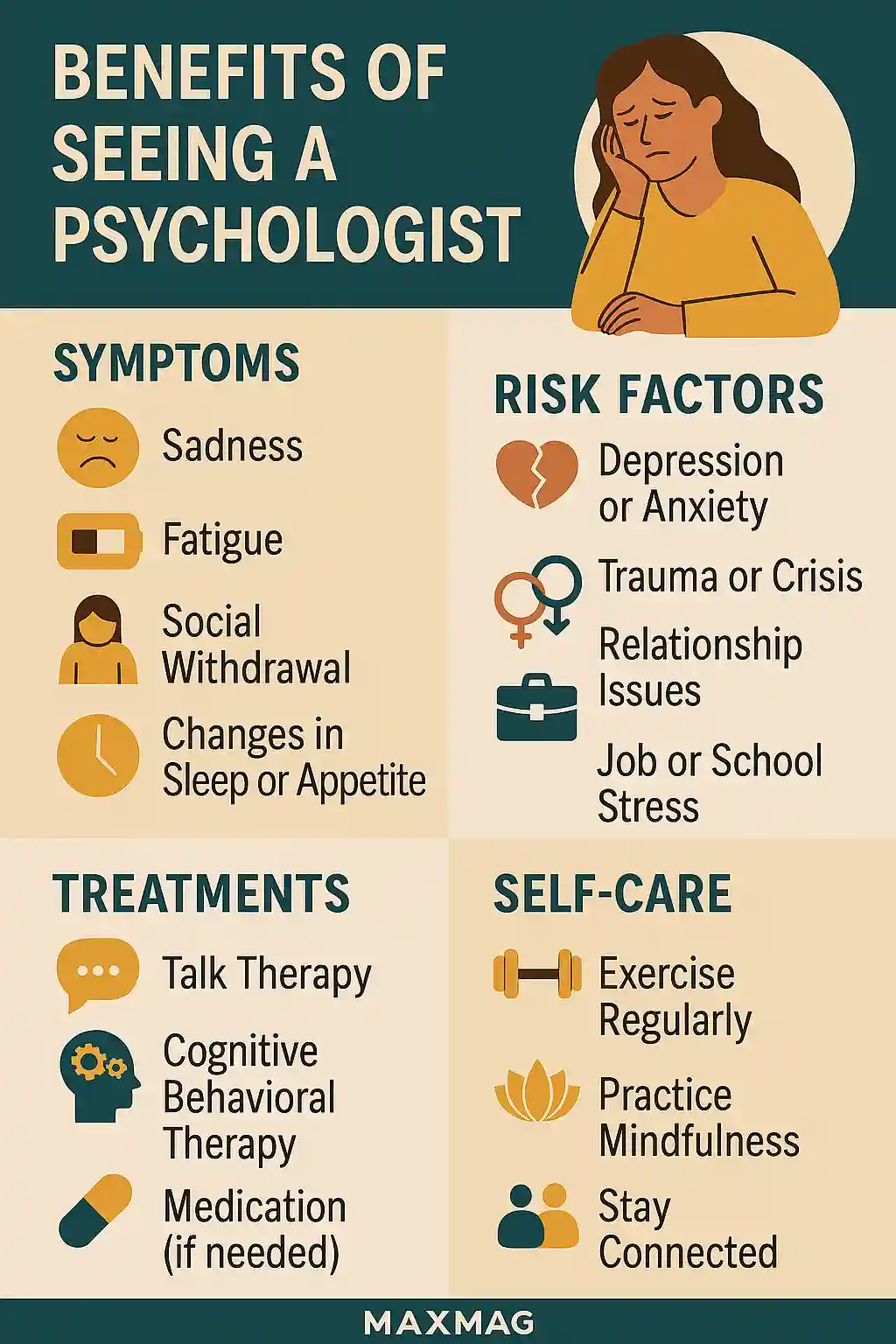
In a world that moves at lightning speed, it’s easy to lose sight of our emotional and mental well-being. Many of us push through anxiety, ignore unresolved trauma, or struggle silently with stress, believing it’s just part of life. But what if there was a professional ally who could help us navigate these invisible battles? This is where the benefits of seeing a psychologist come into sharp focus.
Far from being a luxury or a last resort, therapy is increasingly recognized as a proactive step toward mental wellness. Whether you’re facing a major crisis or simply feel stuck, working with a psychologist can lead to deep, lasting change.
What Does a Psychologist Really Do?
A licensed psychologist is a trained mental health professional who helps people deal with emotional, psychological, and behavioral challenges. They are not just “good listeners.” Psychologists use evidence-based tools like Cognitive Behavioral Therapy (CBT), trauma-informed care, and psychodynamic analysis to identify thought patterns, guide emotional processing, and develop healthier coping strategies.
Unlike casual conversations with friends or self-help books, therapy offers a structured, judgment-free space where transformation is the goal—not just venting.
Top Benefits of Seeing a Psychologist
1. Gaining Emotional Clarity
Sometimes, you can feel overwhelmed without knowing why. A psychologist helps you identify and name your emotions, understand their triggers, and process them constructively. This emotional clarity empowers you to respond thoughtfully rather than react impulsively.
2. Learning Coping Strategies for Anxiety and Stress
Modern life is full of stressors—work demands, financial uncertainty, health fears. Therapy provides proven techniques to manage anxiety, from mindfulness to thought reframing. The benefits of seeing a psychologist include walking away with a personalized toolkit to stay grounded during chaos.
Read the American Psychological Association’s guide to managing stress with therapy
3. Healing Past Trauma
Whether it’s childhood neglect, loss, abuse, or a traumatic accident, many of us carry emotional wounds. Unprocessed trauma can resurface in relationships, careers, or self-image. Psychologists are trained to help clients explore and heal trauma safely.
4. Improving Relationships
Struggles in romantic, family, or workplace relationships often stem from miscommunication or unresolved inner conflict. Therapy helps you understand your own behaviors and emotional needs, making it easier to connect with others in a healthier way.
5. Changing Destructive Patterns
Self-sabotage often feels like a mystery—why do we repeat behaviors that hurt us? Therapy can uncover root causes behind procrastination, addictions, perfectionism, or fear of intimacy. The benefits of seeing a psychologist include breaking cycles that have silently shaped your life.
When Should You Consider Therapy?
Contrary to outdated stigma, therapy isn’t just for people with severe mental illness. It’s a valuable tool for anyone looking to live more intentionally. You might benefit from seeing a psychologist if:
-
You feel stuck or unhappy without a clear reason
-
Anxiety, anger, or sadness feels overwhelming
-
You’re facing a big transition: breakup, job loss, moving, becoming a parent
-
You’ve experienced a trauma that still affects you
-
You notice patterns in your life that limit your growth
Explore Mayo Clinic’s breakdown of when to seek a mental health professional
H3: What Happens During a Therapy Session?
Each session typically lasts 45–60 minutes. During your first visit, the psychologist will:
-
Ask about your personal history, goals, and current challenges
-
Assess your emotional and behavioral patterns
-
Begin shaping a tailored treatment plan
From there, sessions may involve discussing past events, exploring present feelings, role-playing conversations, or practicing new coping skills. While it can feel awkward at first, most people report a growing sense of trust and progress within a few sessions.
Online Therapy: A Modern Alternative
For those with limited access to in-person services or tight schedules, online therapy offers a flexible solution. Platforms like BetterHelp and Talkspace allow you to connect with licensed psychologists from your home. While it’s not ideal for severe conditions, it’s a convenient option for many.
Addressing the Stigma Around Therapy
Many people avoid therapy due to fear of judgment, cultural beliefs, or misconceptions that it’s only for “serious” problems. But mental health is just as important as physical health—and taking care of it is a sign of strength, not weakness.
Cultural movements and mental health advocacy are changing the conversation. Celebrities, athletes, and public figures openly endorse therapy, helping to normalize it for millions.
What to Look for in a Psychologist
Finding the right psychologist is crucial. Here’s what to consider:
-
Credentials: Are they licensed and certified in your region?
-
Specialties: Do they focus on areas like anxiety, trauma, or relationship counseling?
-
Approach: Are they more analytical or supportive? Some people prefer CBT, others gravitate toward holistic methods.
-
Chemistry: Trust your gut. A strong client-therapist relationship is a key predictor of success.
Use resources like Psychology Today’s therapist directory to filter providers by specialty, insurance, and availability.
The Long-Term Benefits of Seeing a Psychologist
The benefits of seeing a psychologist often extend far beyond symptom relief. With time, you may find:
-
Improved self-esteem
-
Healthier relationships
-
Better emotional regulation
-
Greater resilience to life’s challenges
-
Clearer decision-making
-
Increased productivity and creativity
Therapy doesn’t offer overnight fixes—but it plants seeds that bloom across a lifetime.
Success Stories from Real People
“I used to feel guilty for taking time to talk about myself. Now, I understand that caring for my mind is just as important as caring for my body.” — Eleni, 32
“Working with a psychologist helped me understand how my childhood was influencing my parenting. I’ve become a more patient father.” — George, 40
These testimonials echo what research shows: therapy can be life-altering in subtle, meaningful ways.
The Financial Side: Is It Worth the Cost?
Yes. While therapy isn’t cheap, it’s an investment in your quality of life. Here are some options:
-
Many insurance plans cover therapy sessions
-
Sliding-scale fees are available at community clinics
-
Online platforms often offer lower costs
-
Some workplaces offer Employee Assistance Programs (EAPs)
Making the First Appointment
Once you’ve decided to explore therapy, take these steps:
-
Research licensed psychologists in your area or online
-
Schedule a consultation or intro session
-
Prepare to share openly—vulnerability is the first step
-
Be patient; the first few sessions are about discovery, not immediate results






